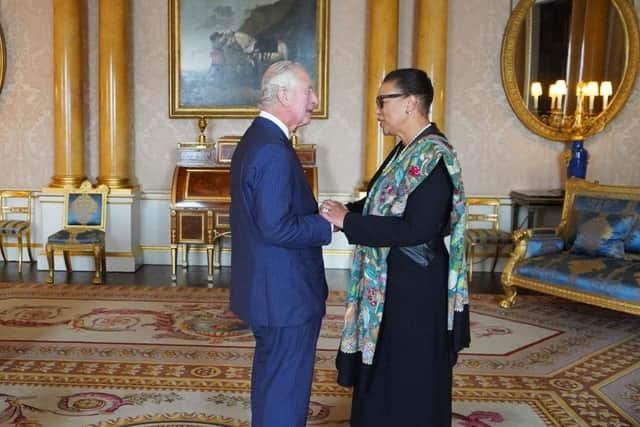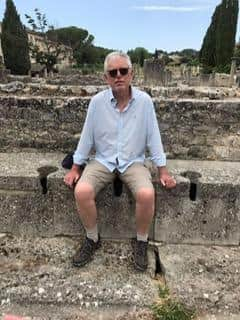Queen Elizabeth II death: Could the Commonwealth survive if members become republics?
Andrew Williams, emeritus professor in the international relations department at the University of St Andrews, and former editor of the Commonwealth Journal, said the organisation could thrive politically, culturally and as a trade body if key governments, including those of the UK, Canada, Australia and New Zealand, committed to it.
Queen Elizabeth II, who died last week, has long been said to be the “glue” that holds to Commonwealth together, sparking questions over its future now the new monarch, King Charles III, is at its head. However, there is a difference between being part of the Commonwealth – a voluntary association of 54 independent countries, almost all of which were formerly under British rule – and having the British monarch as head of state.
Advertisement
Hide AdAdvertisement
Hide Ad"There's no real reason why the head of the Commonwealth should have to be a British monarch,” said Prof Williams. “The Queen's death might lead to the loosening of ties with Britain of the Commonwealth. It doesn’t necessarily mean the end of the Commonwealth if they all became republics. But, they would have to decide whether they wanted the King or the Queen of Britain to be a part of the Commonwealth. And that’s not down to us. In fact, it's down to them.”


He pointed to recent anti-monarchy demonstrations in Edinburgh, held while the Queen was lying at rest in St Giles’ Cathedral last week.
"Obviously [if that happened] there'd be a break with the Imperial past, which is not terribly popular anyway,” he said. “When we've seen with some of the demonstrations in Edinburgh, there's been a definite anti-colonial element to it.”
Although the Commonwealth itself has grown – the last two countries to join the grouping were Gabon and Togo earlier this year – the number of member states which have already declared themselves republics has too.
India paved the way for countries to remain members without the British monarch as a head of state, when it was granted permission to remain, but become a republic in 1948. Barbados was the most recent country to follow suit, in November last year.


While the Queen was head of state for as many as 32 countries in her 70-year reign, by the time of her death, just 14 other than the UK remained, including Canada, Australia and New Zealand. Five other countries – Brunei, Eswatini, Lesotho, Malaysia and Tonga – are monarchies with their own individual monarchs, and the rest are republics.
This week, the prime minister of Antigua and Barbuda declared he would go ahead with a referendum on becoming a republic, while Ralph Gonsalves, prime minister of Saint Vincent and the Grenadines, indicated in July he would also support a poll of his citizens. The prime minister of Jamaica has also said there is “no question” that it should become a republic.
Although New Zealand prime minister Jacinda Ardern has said she believes her country's relationship with the monarchy would “deepen” under King Charles, she has also said she thinks the nation will head towards becoming a republic “in time”. Canada's Justin Trudeau, however, has said the issue is not a current priority for his government.
Advertisement
Hide AdAdvertisement
Hide AdProf Williams said he believed the Queen’s death could act as a catalyst for change within the organisation. It places emphasis on a country's use of the English language and cultural links. However, many cultural schemes, such as Commonwealth scholarships for citizens, have been scaled back in recent years.
The Commonwealth Games, too, which was hosted in Glasgow in 2014, has come under fire in recent years, with some commentators complaining high-level sportspeople are no longer competing.
He said: "Personal popularity makes a big difference and Queen Elizabeth II had an enormous advantage in that she was loved, not just in Britain, but by everybody, more or less, across the world.
"I've heard a lot of people say ‘who knows what's going to happen when she dies?’ She now has and I'm not really sure how it's going to pan out. I hope that it does continue, but I'm a bit worried.”
Global respect for the Queen outside of world politics – even Russian president Vladimir Putin, who has not been issued an invitation for her funeral, described her as having “authority on the world stage” in his tribute on the day of her death – has become even more evident in recent days.
Dozens of heads of state and representatives are expected to attend her funeral tomorrow, including at least ten leaders of countries which are in the Commonwealth.
Among those due to be at the service in Westminster Abbey are Anthony Albanese, prime minister of Australia – which rejected becoming a republic in 1999 – New Zealand’s Ms Ardern, Andrew Holness, prime minister of Jamaica, and Mr Trudeau of Canada.
President Droupadi Murmu of India – whose citizens total almost half of the population of Commonwealth – is also expected to be there. In recent years, India has moved away, politically, from western alliances, joining the Shanghai Co-operation Organisation five years ago – an alliance of China, Kazakhstan, Kyrgyzstan, Russia and Tajikistan and Pakistan.
Advertisement
Hide AdAdvertisement
Hide AdAmitabh Mattoo, an international relations expert based in Delhi, said he believed the Commonwealth, which hosts the annual Commonwealth Heads of Government Meeting, where heads of states and government discuss matters of “mutual interest”, offers countries another opportunity for international diplomacy outside of the formal political groupings.
"We are living in the age of multi-lateral diplomacy, where states want a podium to express their views, advance their interests and shape global norms,” he said. “With its diverse membership drawn from across continents, the Commonwealth provides precisely such a forum.”
Prof Williams said the UK Government needed to lead by example within the Commonwealth if it was to survive the changes.
"The signs of British Government support for it have not been great for a long time,” he said. “[More countries might become republics] if they also see the lukewarm nature of the British Government towards it. If the British Government doesn't put its money where its mouth is, it's not going to give a very good example to anybody else.”
He pointed to the decision to replace a separate Commonwealth Ministry with an “add-on” to the Foreign Office, creating the Foreign and Commonwealth Office in 1968.
"It was much more important [previous to that] and was given a much higher profile,” he said, adding the importance of trade with Commonwealth countries – which at the beginning of the Queen's reign was four times the size of that with Europe – had been set aside after the UK joined the European Commission in 1973. Recent figures from the UK Government show Commonwealth nations now account for 9.4 per cent of the UK’s total trade.
“Now we've left the EU, I think [re-establishing historic trade ties] is what Liz Truss was trying to do, but so far, there has not been much emphasis on the Commonwealth, rather Asia,” said Prof Williams. “If this Government wants to do something positive for the Commonwealth, they could start bigging it up – but I haven’t heard any bigging up yet.”
Comments
Want to join the conversation? Please or to comment on this article.
